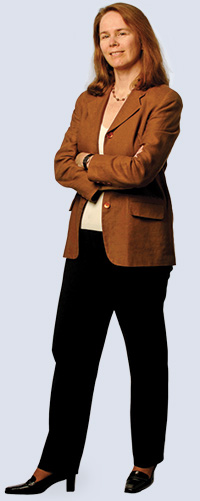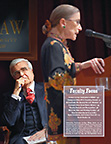Introducing Cynthia Estlund
Catherine A. Rein Professor of Law
Printer Friendly VersionAs a visiting professor last spring,  did something that her colleagues have only fantasized about: She banned laptops in the classroom. “She came in as a complete outsider and tried something new that was likely to completely bug the students. And they went with it,” says Deborah Malamud, AnBryce Professor of Law.
did something that her colleagues have only fantasized about: She banned laptops in the classroom. “She came in as a complete outsider and tried something new that was likely to completely bug the students. And they went with it,” says Deborah Malamud, AnBryce Professor of Law.
Challenging the status quo is typical for Estlund, who will join NYU as a professor this fall. In her scholarship “she raises serious questions as to whether the current labor law system will continue to work in this country,” says Malamud. And her creative thinking has earned her the respect of her peers. “Professor Estlund has done important work exploring the limits of labor law doctrine and integrating First Amendment theory into the law and politics of the workplace,” says Professor Samuel Estreicher, the director of the Center for Labor and Employment Law.
Since entering law school, Estlund’s professional and intellectual interests have centered on labor and employment law. “I liked the idea of representing people who had their own goals and some power to pursue them, but who needed legal help,” she says. But recent decades have not been kind to unions or to labor law. In her last traditional labor law piece, “The Ossification of American Labor Law” (Columbia Law Review 2002), Estlund discusses the multiple barriers to renewing and reforming the labor laws. “It’s a bit of a eulogy,” she says of the paper. “It’s about the many ways in which law reform could happen and does happen in other legal regimes, but doesn’t happen in labor law.” In 2003, she published the book Working Together: How Workplace Bonds Strengthen a Diverse Democracy (Oxford University Press). In it, she argues that the workplace has become the most important site of cooperation, sociability and communication among people of diverse backgrounds. She also hopes to expand her recent article “Rebuilding the Law of the Workplace in an Era of Self-Regulation” (Columbia Law Review 2005) into a book.
Estlund, 49, was born in a small town in Wisconsin. Her late father, Bruce, sang in big bands, then became a newspaper man until the financial pressures of raising three children nudged him into public relations. Her mother, Ann, 71, was a freelance writer. Estlund attended Lawrence University in Appleton, Wisconsin. During college she held jobs in the school’s cafeteria, as a research assistant in an insurance company, as a restaurant hostess and even as an apple-picker. Upon graduating in 1978 with a summa cum laude degree in government, she landed a fellowship to study government programs for working parents in Sweden. She lived for two years in an urban commune, became fluent in Swedish, worked in the antinuclear-power movement and studied sociology. “I was impressed by the role that organized labor had played in building a humane society in Sweden and across much of Europe,” she says.
Returning to the United States, she entered Yale Law School, where she met her husband, Samuel Issacharoff, now 52, a constitutional law expert at NYU. Earning her J.D. in 1983, she clerked for Judge Patricia M. Wald of the D.C. Circuit. While clerking, “we realized that we’d become altogether too boring,” Estlund says. So she and Issacharoff took off for a six-month stint in Argentina, becoming involved in the newly democratic government’s efforts to prosecute the military for human rights abuses. Still not ready to get completely back “on-track” they joined small law firms in Philadelphia before moving to Washington, D.C., where Estlund worked at the high-powered union-side labor law firm Bredhoff & Kaiser.
Balancing competing urges to stay with the pack or go her own way is one of the things that Estlund does best, according to her husband. She also can maintain “a clear-eyed view of the law as a system of governance, power and order,” while not losing sight of what’s right and wrong, he says.
In 1989, they jointly made the leap into academia, landing at the University of Texas School of Law. There Estlund taught property and labor and employment law and became an associate dean for academic affairs. In 1998, Estlund and Issacharoff took offers to visit and then stay at Columbia Law School. Estlund taught and served as vice dean for research.
The move to NYU offers her an academic environment that she calls “a better fit,” and a fresh start as she and Issacharoff face their first year as empty-nesters. Their children, Jessica, 19, and Lucas, 18, will both be at college. Says Estlund: “We’ve been fortunate to find a ‘track’ that allows us to follow our own intellectual fancy, to lay our own tracks, you might say.”
—
